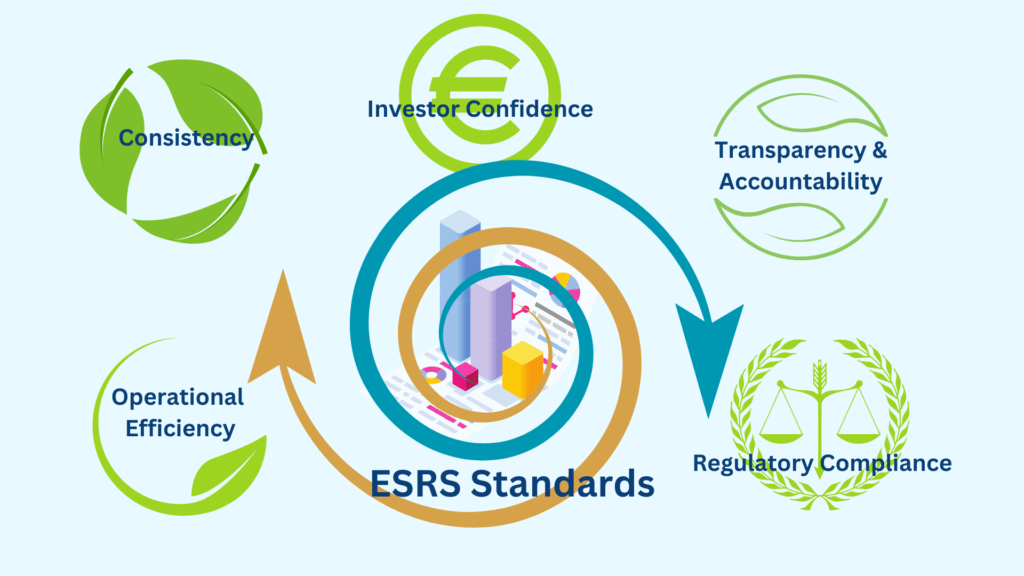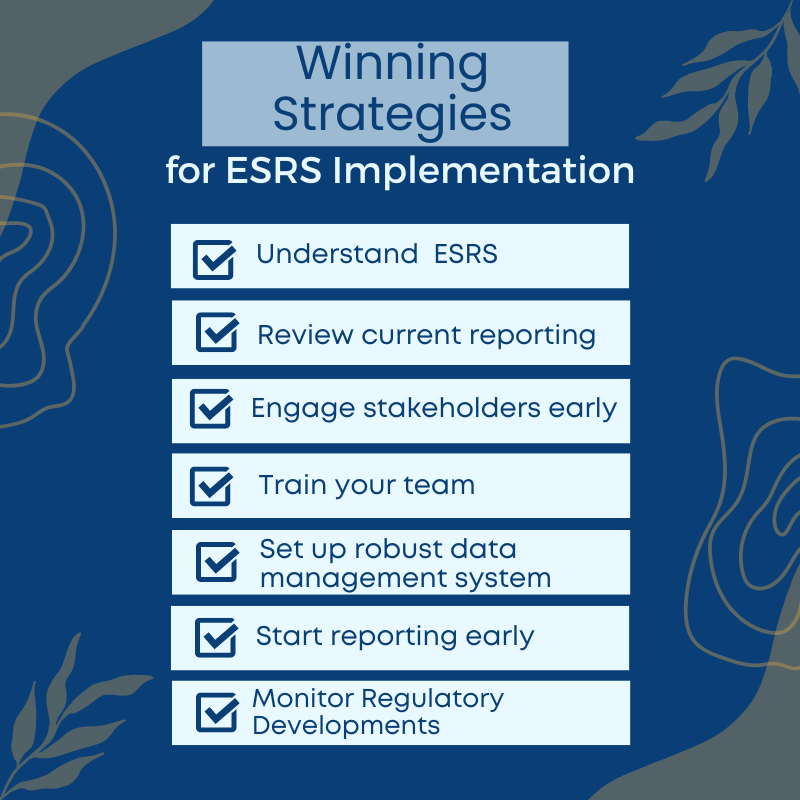Sustainability is no longer a mere buzzword in the business world – it’s an imperative. In line with this reality, the European Union has established the European Sustainability Reporting Standards (ESRS) to enhance transparency and provide clear guidelines for sustainability reporting. These new standards are set to bring profound changes to how businesses across Europe and beyond manage and report on their environmental, social, and governance (ESG) performance.
What are the European Sustainability Reporting Standards (ESRS)?
Before diving into the implications of ESRS, it’s essential to understand what these standards entail. The ESRS, established by the European Financial Reporting Advisory Group (EFRAG), aim to standardize the way companies across the EU report on their sustainability efforts.
The intention is to make sustainability reports as reliable and comparable as financial reports, facilitating better decision-making by stakeholders and contributing to the achievement of sustainable development goals.
The first set of ESRS published in November 2022 had 12 standards outlining what and how companies must report on their sustainability performance.
Implications of European Sustainability Reporting Standards for Businesses
If you prefer visual content over reading the blog, take a look at our summary video below.
The ESRS’ implementation represents a paradigm shift in corporate sustainability reporting, bringing about several implications for businesses. The ESRS is expected to streamline ESG reporting throughout the EU, ensuring high quality of data used for sustainability reports that are comparable and findable.

Increased Transparency and Accountability
One of the significant outcomes of implementing ESRS is increased transparency and accountability. Companies will need to disclose detailed information about their sustainability efforts, including their environmental impact, social practices, and governance structures. This transparency will allow stakeholders, including investors, consumers, and regulators, to make more informed decisions.
Greater Consistency in Reporting
The ESRS also introduces more consistency to sustainability reporting. With a standard framework in place, businesses can now compare their sustainability performance against their peers, enabling them to identify areas of improvement and adopt best practices.
Businesses will have to improve its current sustainability reporting process, especially applying the concept of double materiality to identify most relevant sustainability matters to report on. Companies must report on material impacts, risks and opportunities and the effectiveness of actions taken to address these. Additionally, companies must report on policies, metrics and targets related to their sustainability efforts.
Higher Investor Confidence
Increased transparency and consistency can lead to heightened investor confidence. By providing comprehensive sustainability information, businesses can demonstrate their commitment to sustainable practices, appealing to a growing cohort of investors interested in responsible investing.
Operational Efficiency
While the ESRS requires more detailed reporting, this process can also help businesses identify inefficiencies and potential risks within their operations. The insights gained can then drive improvements in operational efficiency and risk management.
Regulatory Compliance
With the introduction of ESRS, sustainability reporting is no longer optional for companies operating in the EU, except macro companies. To avoid regulatory penalties and reputational damage, businesses must ensure their reporting meets the ESRS requirements. Successful implementation of the ESRS will ensure compliance with the Corporate Sustainability Reporting Directive (CSRD).
Potential Challenges
While there are clear benefits to implement ESRS standards, businesses also face challenges in their implementation. These challenges may include increased reporting costs, the need for new expertise, and the complexity of integrating sustainability data into existing reporting structures. The draft ESRS emphasizes the importance of mandatory disclosures on the materiality assessmet, climate change and key topics related to own workforce of the reporting organization.
The CSRD explicitly requires sustainability reports to be verfied by independent assurance service providers. This will enhance credibility of sustainability reports, but also means more costs for the reporting company as their reports must be auditted.
Embracing the Future of Sustainability Reporting
Despite the potential challenges, the adoption of ESRS presents an opportunity for businesses to align their strategies with sustainability goals and demonstrate their commitment to a greener and more equitable future. The era of sustainability is here, and through initiatives like the ESRS, businesses have the chance to play a significant role in shaping the sustainable development trajectory.
In summary, the ESRS represents a significant milestone in corporate sustainability, and while its implementation comes with challenges, the opportunities far outweigh them. By embracing the ESRS, businesses can improve their transparency, enhance their reputation, and contribute to the wider sustainability agenda.
ESRS Courses by The CSRD Compass
Ready to take your knowledge and skills to the next level? Don’t miss out on the exciting eCourses offered by The CSRD Compass! Whether you’re a seasoned professional, or simply curious about the world of sustainable development, our comprehensive and engaging courses are designed to empower you with the tools and insights you need to make a positive impact.
Join our thriving community of learners who are passionate about creating a sustainable future. Don’t wait—take the first step today! Visit The CSRD Compass page here to discover our eCourse offerings and enroll in the course that resonates with you. Together, let’s shape a better world through knowledge and action.


